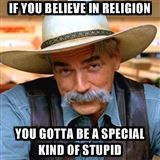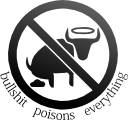|
A THANKSGIVING SERMON.
by Robert G. Ingersoll (this is my sliced and diced, hacked version) The very basic tenet of Christianity is ignorance. This is the very first lesson from the Garden Of Eden. Eating from the Tree of Knowledge is very bad. MANY ages ago our fathers were living in dens and caves. Their bodies, their low foreheads, were covered with hair. They were eating berries, roots, bark and vermin. They were fond of snakes and raw fish. They discovered fire and, probably by accident, learned how to cause it by friction. They found how to warm themselves- to fight the frost and storm. They fashioned clubs and rude weapons of stone with which they killed the larger beasts and now and then each other. Slowly, painfully, almost imperceptibly they advanced. They crawled and stumbled, staggered and struggled toward the light. To them the world was unknown. On every hand was the mysterious, the sinister, the hurtful. The forests were filled with monsters, and the darkness was crowded with ghosts, devils, and fiendish gods. These poor wretches were the slaves of fear, the sport of dreams. Now and then, one rose a little above his fellows - used his senses - the little reason that he had - found something new - some better way. Then the people killed him and afterward knelt with reverence at his grave. Then another thinker gave his thought - was murdered - another tomb became sacred - another step was taken in advance. And so through countless years of ignorance and cruelty - of thought and crime - of murder and worship, of heroism, suffering, and self-denial, the race has reached the heights where now we stand. Looking back over the long and devious roads that lie between the barbarism of the past and the civilization of to-day, thinking of the centuries that rolled like waves between these distant shores, we can form some idea of what our fathers suffered - of the mistakes they made - some idea of their ignorance, their stupidity - and some idea of their sense, their goodness, their heroism. It has been a long long road
For the blessings we enjoy - for the happiness that is ours, we ought to be grateful. Our hearts should blossom with thankfulness. Whom, what, should we thank? Let us be honest - generous. Should we thank the church? Christianity has controlled Christendom for at least fifteen hundred years. During these centuries what have the orthodox churches accomplished, for the good of man? In this life man needs raiment and roof, food and fuel. He must be protected from heat and cold, from snow and storm. He must take thought for the morrow. In the summer of youth he must prepare for the winter of age. He must know something of the causes of disease - of the conditions of health. If possible he must conquer pain, increase happiness and lengthen life. He must supply the wants of the body - and feed the hunger of the mind. What good has the church done? Has it taught men to cultivate the earth? to build homes? to weave cloth to cure or prevent disease? to build ships, to navigate the seas? to conquer pain, or to lengthen life? Did Christ or any of his apostles add to the sum of useful knowledge? Did they say one word in favor of any science, of any art? Did they teach their fellow-men how to make a living, how to overcome the obstructions of nature, how to prevent sickness-how to protect themselves from pain, from famine, from misery and rags? Did they explain any of the phenomena of nature? any of the facts that affect the life of man? Did they say anything in favor of investigation - of study - of thought? Did they teach the gospel of self-reliance, of industry - of honest effort? Can any farmer, mechanic, or scientist find in the New Testament one useful fact? Is there anything in the sacred book that can help the geologist, the astronomer, the biologist, the physician, the inventor - the manufacturer of any useful thing? What has the church done? |
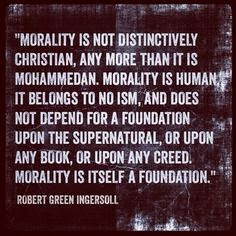
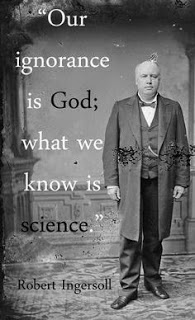
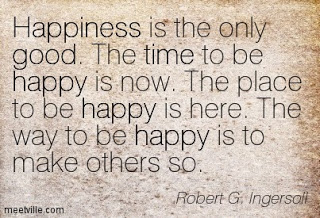
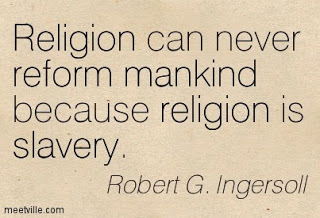
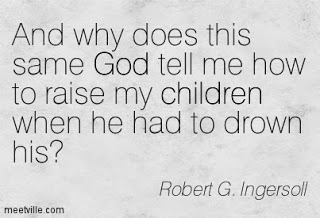
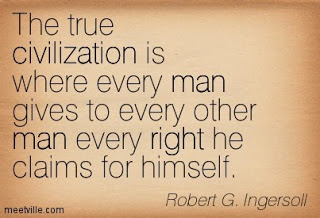
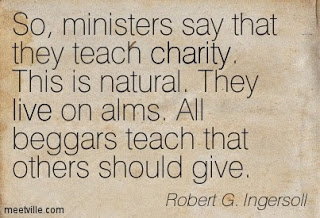
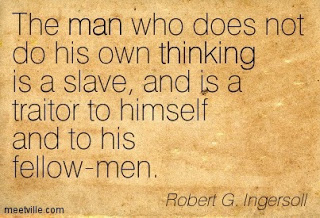
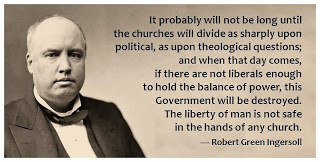
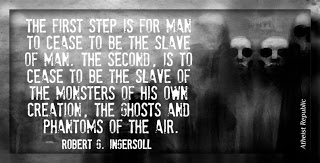
Send comments to:
 hjw2001@gmail.com
hjw2001@gmail.com
|


